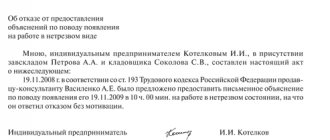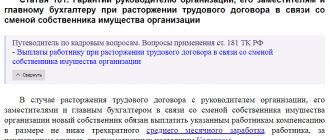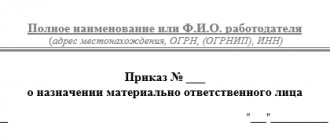Regulatory legal acts upon dismissal due to a change of owner
Consideration of the procedure for dismissing an employee during a change of owner implies a close connection between the labor and civil codes of the Russian Federation, which explain in detail the rights and obligations of both parties.
Article 75.81 of the Labor Code of the Russian Federation presents all categories of employees who are subject to dismissal upon a change of ownership and specifies the time frame for resolving the issue that has arisen. The Civil Code provides for the consideration of disputes between two parties during the procedure.
An important aspect when transferring property into private ownership is the Law “On Privatization dated December 21, 2001 No. 178 FZ. This provision is necessary when considering a possible dispute over ownership.
When resolving labor disputes, it is necessary to submit the Supreme Court Resolution No. 2 of March 17, 2004, which contains all the necessary information on the legality of the procedure in accordance with the law.
Important
Dismissal of an employee upon a change of owner is impossible without a legal basis prescribed in the current legislation of the Russian Federation. If there is no basis, the procedure will be carried out in violation of the law.
Cases of changes in the ownership of an organization
When studying legal acts of legislation, it is impossible to present a clear concept of a change of owner in any organization. At the same time, some provisions explain the procedure for completing the procedure:
- in accordance with the resolution of the Plenum No. 2, paragraph 32 of the Supreme Court, a change of ownership is considered to be the transfer of property rights from one person to another;
- The first article of Law No. 178 FZ implies a change of owner during the privatization of an enterprise and its subsequent transfer to private ownership. In this case, the procedure should be free of charge;
- Art. 235 Civil Code of the Russian Federation and 2 art. 218 of the Civil Code of the Russian Federation considers the process of transferring property from private individuals to the state through transactions for the alienation of property (purchase and sale).
In order to carry out the transfer of property, state registration of property is required in accordance with the norms of the Civil Code of the Russian Federation. Registration of the procedure is possible subject to compliance with the above-described legal provisions prescribed in the current legislation.
A change of owner is considered to be a change in legal entity, the concept of which is clearly defined in Art. 48 Civil Code of the Russian Federation:
- a legal entity is understood as an organization that has separate property, is responsible in court and fulfills all necessary obligations;
- mandatory registration of a legal entity in the unified state register;
- state and municipal institutions are classified as legal entities, since their founders have certain rights to this property;
- Corporate organizations are also legal entities because their members have corporate rights.
For your information
A change in the composition of the founders is not a change in ownership, therefore, in this case, the dismissal procedure is not applicable. It is important to distinguish this concept when making an appropriate decision.
Categories of employees subject to dismissal
The concept of a change in the owner of an organization does not have direct legal grounds for terminating an employment relationship. The new owner has the right to use Art. 75 of the Labor Code of the Russian Federation and dismissal of workers in such positions:
- head of the enterprise;
- assistant managers;
- Chief Accountant.
Important
The above list of positions subject to dismissal is final, therefore, in case of violation of the law, the injured party has the right to file a claim in court.
In some cases, employers often fire employees who are not listed in the above list, therefore, when the case is considered in court, a positive satisfaction of the claim will be in favor of the dismissed employee (decision No. 33-175-15 of 01/12/2015).
For your information
When there is a change of owner, employees of the relevant enterprise have the right to dismiss at their own request due to changed circumstances (Clause 6, Article 77 of the Labor Code of the Russian Federation). The procedure is carried out according to the usual algorithm by submitting an application to the personnel department.
Can the new owner of a company fire its manager?
In accordance with the Labor Code of the Russian Federation, the new owner of the property of a legal entity has the right to dismiss its director, his deputies and the chief accountant (clause 4, part 1, article 81 of the Labor Code of the Russian Federation).
First of all, it is necessary to determine what it means to be a new owner of the organization’s property. In many organizations, the owner of the property is the legal entity itself, and not a person.
In LLCs and JSCs, the founders and participants of companies do not own their property and have no rights to it. If one of them sells his share or share to another person, he will not become an owner, although he will have the right to make decisions on the management of the company and receive income from its activities. That is, when the founders and participants of LLCs and JSCs change, this rule does not apply. This is confirmed by the Plenum of the Supreme Court in paragraph 32 of the resolution of March 17, 2004 No. 2.
The Civil Code defines: organizations to whose property the founders have proprietary rights are state and municipal unitary enterprises, as well as institutions (clause 3 of Article 48).
Thus, there are only two types of legal entities to which the Labor Code provision on the right of the new owner to dismiss management is applicable:
- state and municipal enterprises;
- institutions - state, municipal and private.
The following institutions are created in the form of institutions:
- schools;
- hospitals;
- social centers.
For example, if a private educational institution becomes municipal property, the municipality, as the new owner, can dismiss the director under clause 4 of Part 1 of Art. 81 Labor Code of the Russian Federation.
Let’s now figure out who exactly can be fired by the new owner of the company’s assets and under what conditions. Within the framework of the norm specified in the Labor Code of the Russian Federation, only managers can be dismissed: the general director or director of the organization, his deputies - and the chief accountant, that is, employees who have the right to make financial decisions in the organization.
The new owner of a legal entity can terminate the employment contract with the above-mentioned officials (that is, dismiss them) no later than 3 months after taking ownership (Part 1 of Article 75 of the Labor Code of the Russian Federation).
The general director, any of his deputies, or the chief accountant of the organization cannot be fired if they are on sick leave. This is a mandatory rule for all employees.
In addition, it is prohibited to dismiss anyone who is on vacation (in accordance with Part 6 of Article 81 of the Labor Code of the Russian Federation), as well as to terminate an employment contract with a pregnant woman (in accordance with Article 261 of the Labor Code of the Russian Federation).
However, the new owner, whoever he is (a private individual or a public administrator), often needs to update the staff of the acquired organization, and not only at its highest level - companies are sometimes sold not because of a good life, but due to the lack of proper profitability and large number of management errors.
Russian legislation provides grounds for dismissing other employees of an organization, in addition to the director, his deputies and the chief accountant when the owner of the organization changes:
- the new administration may receive a written refusal from an employee (who is neither the general director of the company, nor his deputy, nor the chief accountant) to fulfill his duties in connection with a change in the owner of the organization (in accordance with clause 6, part 1, article 77 of the Labor Code of the Russian Federation);
- The organization can downsize its workforce.
The latest legal technology is much more widespread. We’ll talk about it in more detail later, but for now let’s summarize: among all personnel, the positions most vulnerable to dismissal when the owner of the company changes are:
- general director;
- his deputies;
- chief accountant.
However, all other employees (without restrictions) also risk losing their jobs if the new owner initiates a staff reduction procedure.
When an employee cannot be fired under the current circumstances
Dismissal of an employee upon change of ownership cannot be carried out if the employee is currently on sick leave or on vacation.
The current legislation of the Russian Federation provides for cases in which the dismissal of certain categories of employees is prohibited:
- pregnancy in women;
- single mothers with minor children under 14 years of age or with disabilities;
- women with small children under 3 years of age;
- workers raising a child without a mother;
- sole breadwinners in a family with children under 3 years of age;
- the employee has a large family in which he is one employed person.
Registration of the dismissal procedure
Important
Dismissal can be carried out no later than 3 months from the date of change of ownership of the organization’s property.
- The procedure for dismissing an employee when there is a change of owner has a certain algorithm in accordance with the norms of the Labor Code of the Russian Federation:
- issuing a written notice to the employee about the upcoming termination of the employment relationship (not a mandatory item, since the Labor Code of the Russian Federation does not establish the employer’s obligation to notify employees in advance about the termination of the employment contract);
- issuance of a dismissal order, which is signed by the employee and the new head of the enterprise, as well as by an employee of the human resources department;
- full settlement with the dismissed employee and payment of all necessary monetary compensation;
- making an entry in the work book and saving a copy in the archive of the enterprise;
- issuance of a work book and a special journal entry to record the movement of documentation.
For your information
The new owner of the enterprise may, if desired, offer the dismissed employee a transition to a new position, subject to the consent of the employee.
How to fire the general director and his deputies when there is a new owner?
If the new owner of the organization nevertheless decides to dismiss employees in terms of senior management - the general director, his deputies or the chief accountant, then for this the following algorithm must be followed:
- This decision must be formalized in the form of an administrative act of the governing body, which must have the appropriate powers. As a rule, this is done by decision of the owner with the simultaneous appointment of new employees to these vacant positions.
- A personnel order must be issued, with which the dismissed employee must be familiarized with signature.
- In accordance with Art. 140, as well as Art. 181 of the Labor Code of the Russian Federation, a dismissed employee must be paid a minimum compensation in the amount of 3 average monthly (within the current year) payments.
- In accordance with Art. 84.1 of the Labor Code of the Russian Federation, the current administration of the company is obliged to hand over to the dismissed employee his work book with a record of dismissal and indicating the article.
If an employment contract with a dismissed employee provides for additional payments from the organization to the latter, then they must be made before issuing a work book).
Abrupt changes in personnel policy are very difficult for the new owner of the company. In fact, all dismissals - be it senior management or ordinary employees - must be carefully justified, which makes this measure very difficult to implement. This protects the rights of employees from unjustified termination of the contract, since more compelling reasons are needed for dismissals.
Entry in the work book
When an employee is dismissed due to a change of owner, a special entry is made in the work book, which is the basis for the procedure (Resolution of the Ministry of Labor of the Russian Federation No. 69 of March 10, 2013).
After entering the date in the column “employment information”, indicate the following text: “dismissed due to a change of owner, paragraph 4, part one, art. 81 Labor Code of the Russian Federation." The last column indicates the number and date of the order, which is the basis for dismissal.
The completed book is given to the dismissed employee with the company seal affixed, the signature of the HR department employee and the owner of the document. All data is entered into the accounting book, which is subsequently archived and remains at the enterprise.
Payments upon dismissal
The procedure for processing payments in connection with a change of owner is carried out in accordance with Art. 181 Labor Code of the Russian Federation. Upon termination of an employment contract with a manager, chief accountant or deputy. boss, the new owner is obliged to pay benefits in the amount of three months' salary (with the exception of cases provided for by law).
Also, the dismissed employee receives the rest of his salary and compensation for unused vacation.
Art. 279 of the Labor Code of the Russian Federation provides for the mandatory payment of compensation to the manager upon termination of an employment contract. The amount must be at least three times the average monthly salary.
The compensation amount does not include the following charges:
- salary balance;
- saved salary in case of business trip, vocational training or additional education;
- reimbursement of expenses incurred during business trips or moving to another region;
- compensation for all unused vacations;
Important
The manager has the right not to pay benefits if the reason for dismissal is disciplinary action for a number of reasons (violation of the Labor Code of the Russian Federation).
The procedure for terminating labor relations with employees
The procedure for terminating employment contracts may differ depending on the grounds. Let's consider step by step how to fire staff if the procedure for changing the owner of the organization has been carried out.
Dismissal at the initiative of the employer during a change of owner contains several main stages:
- Within three months from the date of receipt of ownership rights, the owner of the company makes a decision on dismissal in the form of an administrative act or minutes of a meeting of the management body. If the employer fails to meet the deadline established by law, it will no longer be possible to calculate the listed personnel on the basis of a change of ownership.
- Delivery of notice of termination of an employment contract. The notification does not have a special form and can be issued in free form, but with mandatory references to the Labor Code of the Russian Federation.
- Filling out the employee’s personal card, created on the day of reception. The employee's due accruals and deductions are made.
- Issuing an order for dismissal, form T-8 . The employee must be familiar with the document before signing.
- Making an entry in the work book. This is done by a personnel employee or other person responsible for storing and maintaining work records. All entries are made in the document on the basis of instructions approved by Resolution No. 69.
- On the last working day, the employee is given a work book and a full payment.
If the new owner decides not to fire management, but the employee himself does not want to stay, he has the right to write a written refusal to continue working. But he will no longer be able to count on severance pay.
Important! When the owner of the company changes, all employees have the right to refuse further work.
The procedure for dismissing personnel due to a change in the owner of the enterprise:
- The employee writes a written refusal to work under the new owner. The law does not establish a deadline for filing an application. Typically, such an application is issued in response to a notice of reorganization, but can be submitted much later. The employee retains the right to withdraw the application until the day of departure (inclusive).
- The employer can offer other positions to the employee, and if he refuses to continue working, the dismissal procedure is initiated.
- An order to terminate the employment contract is drawn up , with which the employee must be familiarized with his signature.
- A full payroll calculation is made, all necessary deductions are made, and the employee’s personal card is filled out.
- An entry is made in the work book.
- On the day of dismissal, the employee receives a paycheck, a work book and the necessary certificates.
In both cases, the employee must receive full payment. It includes wages for actual time worked and compensation for unused vacation.
According to Art. 181 of the Labor Code of the Russian Federation, upon dismissal at the initiative of the organization, the dismissed manager will receive an additional severance pay in the amount of not less than three times the average salary.
If an employee leaves on his own initiative due to a change of ownership, he will not receive severance pay.
After state registration, the new owner has the right to revise the staffing table and reduce staff. But the basis for dismissal here will be somewhat different - “due to staff reduction.”
This is another article of the Labor Code of the Russian Federation; it implies payment of severance pay and payment of the employee’s average earnings for a period of unemployment for up to 3 months.
In such circumstances, the employer must notify staff of the layoff in writing 2 months in advance. Additionally, he notifies the labor exchange about the released people.
What documents need to be completed?
When dismissing personnel due to a change of ownership, the following documentation is drawn up:
- The decision to terminate employment contracts is if the new owner wishes to dismiss the manager, his deputies or the chief accountant.
- Notification of dismissed persons at the initiative of the employer. This document is not legally binding.
- Act of acceptance and transfer of cases. Usually it is drawn up upon the dismissal of persons in management positions for the transfer of: valuables, documents, electronic signatures and keys.
- An application for resignation due to a change of ownership is an actual refusal to work. There is no need to arrange it in advance. The employer will make the payment at the time required by the employee.
An example of a refusal:
To the head of Mak LLC
Mukhina A.A.
from the working SGP
Romashkina A. A.
Statement
Based on Art. 75 of the Labor Code of the Russian Federation I refuse to work in a company due to a change of owner
01/25/2018 Signature Romashkin A. A.
- Order of dismissal one T-8 employee or several T-8 employees a. It is allowed to use other forms of orders if they are approved by the company’s manager. Main points of the document:

Company name; - Title of the document;
- order number and date of issue;
- FULL NAME. position and structural unit of the dismissed person;
- grounds for dismissal and its date;
- attached supporting documents;
- manager's signature;
- employee familiarization visa.
- Closing an employee's personal card. The dismissed person must put his signature in specially designated areas of the document.
- An entry is made in the employee’s work book about the actual dismissal under the relevant article.
- Certificates are issued: 182-N and SZV-STAZH. If an employee needs other certificates or copies of documents, he has the right to make a written request. The employer must issue them within 3 days.
If the employer has already taken ownership and has come to the conclusion to carry out a reduction, the following is issued: an order to reduce staff, a notice of upcoming dismissal for each employee.
Sample book entry
An entry in the work book regarding dismissal based on a change of owner can be of two types:
- “Dismissed due to a change in the owner of the property, clause 4, part 1, art. 81 Labor Code of the Russian Federation."
An example of making an entry in a work book:
- “Dismissed due to refusal to continue working due to a change of owner, clause 6, part 1, art. 77 Labor Code of the Russian Federation."
An example of making an entry:
If the contract is terminated due to staff reduction, the entry must refer to the second paragraph of Art. 81 Labor Code of the Russian Federation. Here reference to a change of owner is no longer made.
Consequences for the employer
If the rights of a dismissed citizen are violated and labor legislation is not observed, the employee has the right to file a claim to restore the lost position.
If the departmental structure of the enterprise has changed, then this aspect is not grounds for forced dismissal. If desired, the new owner can dismiss workers due to layoffs or for any other reason prescribed in the Labor Code of the Russian Federation.
Violation of norms upon dismissal due to a change of ownership implies liability by the employer in accordance with Art. 5.27 Code of Administrative Offences. The solution to the issue of eliminating the management staff may be alternative proposals for transfer to another position, subject to the consent of the person concerned.
How are employees dismissed?
If the new owner is not satisfied with the quality of the acquired company’s personnel, then he can fire not only the top management of the organization, but everyone in general, initiating a staff reduction. However, the new employer must comply with the following conditions:
- He must develop a justification for the need to reduce the number of personnel of the legal entity and properly notify all employees who are being reduced.
- The reduction must be objective, and not just formal, the purpose of which is to eliminate the “undesirable”.
- It is necessary to provide retrenched employees with guarantees in accordance with Part 1 and Part 2 of Article 178, as well as Art. 179 and art. 180 Labor Code of the Russian Federation.
- The employer is obliged to comply with restrictions on dismissals on his initiative (in accordance with Part 6 of Article 81, as well as Parts 1 and Part 4 of Article 261 of the Labor Code of the Russian Federation).
Typical mistakes new employers make when implementing this procedure are:
- inconsistency of the dismissal procedure with the stated grounds (for example, “urgent” dismissal is justified by the impossibility of further payment of wages, despite the fact that the legal entity records profit within the reporting period);
- procedures for consistent staff reductions are not followed and (or) not implemented at all;
- staff reductions in the organization begin before the process of state registration of ownership rights to the acquired company is completed;
- violation of restrictions and prohibitions imposed by the Labor Code of the Russian Federation when carrying out dismissals and staff reductions (for example, dismissal of employees on maternity leave, lack of compensation payments for dismissal at the initiative of management, etc.).
Is it possible to challenge dismissal?
When considering the question of whether it is possible to challenge dismissal in connection with a change of owner, it should be understood that consideration of the case in court implies the presence of irrefutable evidence that the rights of the dismissed employee were violated during the procedure.
It is best to file a claim directly to the court, since when considering the case, the plaintiff’s costs are minimal, and if the claim is satisfied, it is possible to receive compensation for moral damage caused.
Violation of employee rights occurs in the following cases:
- lack of written form of the concluded employment contract;
- incorrect entry of data into the document;
- termination of a contract with a person who is not included in the category of employees subject to dismissal upon a change of ownership.
If the claim is satisfied, the employee can count on reinstatement and receiving his previous job with the same salary. Corresponding changes are made to the work book and personal card.
conclusions
When changing ownership, it is not necessary to dismiss the entire staff of the enterprise. Moreover, a change in the ownership of property is not grounds for terminating contracts with key personnel.
Only the management team and the chief accountant are subject to dismissal. At the same time, the new owner must fill out all the documents correctly, and he has only three months to make a decision.
After this period, dismissal with the wording of a change of owner cannot be carried out; this will be an illegal action.
In any case, first of all, a notice is issued, which the employee must sign. Only then is the order issued.






